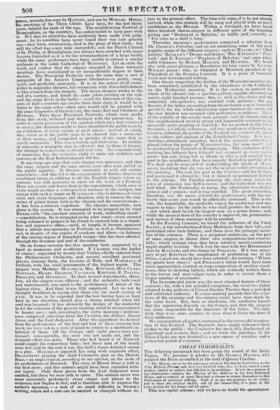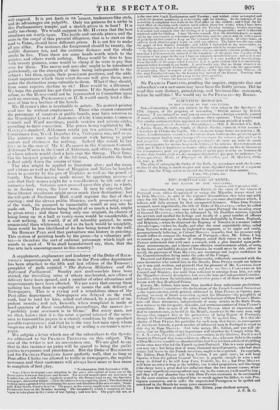will succeed. It is put forth in an ''nonest, tradesman-like
style, and its advantages are palpable, Only ten guineas for a niche in
this Parliamentary temple-, ,and a sketch given in to boot! It is
really too cheap, We 'Would suggest to Mr. HAYTER that the best situations are worth snore. The inside and outside places, and the
seats in the coupe of this pictorial diligence, that is to start on the road to Fame, should have different prices. ,It is not fair to make all limy alike. For instance, the foreground should be twenty, the
middle distance ten, and the extreme distance and the shade might be live. Then there are some heads worth much to the Fainter, and others worth nothing. Many would be dear to him with twenty guineas, some would be cheap if he were to pay that sum for them. The mover and seconder ought to be introduced gratuitously, on the strength of their being indispensable to the subject ; but then, again, their prominent positions, and the addi- tional importance which their court dresses will give them, must make the distinction more valuable to them. What if they should, from some caprice, decline to sit ? Here would be a dilemma! We hope the painter has got their promise. If the Speaker should refuse, as the House could not be represented in Committee upon such an occasion, PICKERSGILL or H. B. would surely lend a like- ness of him to a brother of the brush.
Mr. HAvrEn's idea is invaluable to artists. No portrait-painter need now be without employment. Those who cannot command the patronage of senators or public boards, may have recourse to the Worshipful Courts of Assistants of City Companies, Common Council and Ward meetings, parish vestries and private clubs, according to their connexion. The prices being regulated by Mr. HAYmas standard, Aldermen might pay ten guineas, C:immon Councilmen five, Ward Deputies two, Vestrymen one, and so on. The painters must make their account with having to paint orators and eh:lint:on for nothing. Indeed this would be but fair; as in the case Mr. C. PEARSON in the Common Council, Alderman WOOD in the Court of Aldermen, and others, the lustre of whose talents would shed a halo over the throng. Their fame, like the buoyant principle of the life-boat, would enable the bark to flout safely down the stream of time.
The idea might be applied to literature also ; and the name and virtues as well as the face of Muggins and Nokes be handed down to posterity by the pen of Hopkins as well as the pencil of Smith. One STOCKDALE made money by apprizing persons of note that their names might for a consideration be left out of an infamous book. Satirists must proceed upon this plan; in \ilia, as in donkey races, the loser wins. It may be objected, that these literary omnibuses might never reach their destination : but the toll-gate of Stationers' Hall would register the fact of their starting ; and the eleven public libraries, each possessing a copy of the work, its passport to immortality would at any rate be made out. The pictures being bought at so much a head, might be given away; and there being only one original, its chance of being hung up in a hall or vestry-room would be considerable, if it cost nothing. It would, if at all tolerably painted, be more ornamental than whitewash; and as its back would be unsightly, there would be less likelihood of its face being turned to the wall.
Sir ROBERT PEEL said that portraiture was history in painting. This system of painting heads by the gross—by a voluntary poll- tax—is therefore the sort of national patronage which high art stands in need of. Who shall henceforward say, then, that the fine arts lack ‘encouragement in this country ?



















 Previous page
Previous page